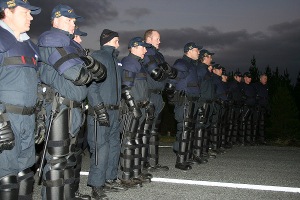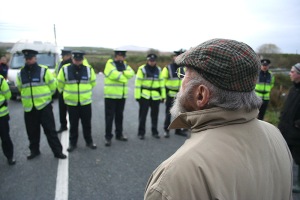BOOK REVIEW: ‘Once Upon a Time in the West: The Corrib Gas Controversy’
Lorna Siggins
Transworld Ireland £14.99
[ First published in the Irish Examiner on January 15th, 2011 – in a slightly shorter, edited version ]
by William Hederman
This is not the first book about the Corrib gas saga to feature ominous storm-clouds on its cover. The choice of image will resonate with anyone who has visited the isolated corner of northwest Mayo where this remarkable drama has played out. A landscape of desolate beauty that would normally instil calm has been suffused with menace and angst in the decade since Enterprise Oil – since bought by Royal Dutch Shell – proposed building an inland gas refinery and high-pressure, raw gas pipeline in a shifting blanket bog with a history of landslides.
Journalist Lorna Siggins tells the long and extraordinary story of families in the remote farming and fishing communities around Rossport and Pollathomas, whose resistance to the development propels them from lives of quiet obscurity into years of legal actions, scientific research, civil disobedience and even imprisonment. In scenes resembling a Hollywood movie, some of these people first learn that their land is on the pipeline route when they look out their windows to see men in dark glasses in their fields with surveying equipment.
They juggle work and parenting to attend dawn protests, lengthy oral hearings and court sittings, going head-to-head with top barristers and engineering consultants as they make the case for having the gas from Corrib processed offshore and piped ashore at low pressure. The depth of their technical knowledge consistently astounds observers at these hearings.
The Corrib affair is of huge significance nationally, not least because of the question of ownership of the gas that will come ashore and because of the precedent the project creates for other big infrastructural projects in Ireland. As Fintan O’Toole writes in the book’s foreword, “within it are many of the large themes of 21st-century-politics”. Yet public understanding of Corrib ranges from confused to non-existent, thanks to a sea of hysteria, propaganda and misinformation and the fact that much of the news media takes an interest only at times of physical confrontation and uses crude brush-strokes in its portrayal of campaigners.
Once Upon a Time in the West provides, at last, an authoritative and comprehensive documentary of Corrib’s troubled history and a dispassionate assessment of the contentious issues, meticulously researched and footnoted, with a 10-page timeline. An invaluable record and reference, it is also an absorbing drama that Siggins moves along at a lively pace, interwoven with various contexts: local history, family backgrounds and the stories of humanity and humour that intersperse the conflict.

Gardaí in riot gear block the road near Bellanaboy at dawn in November 2007. Copyright: William Hederman
The book sets the record straight on numerous myths that have been fed into the public consciousness by years of spin and misreporting – for example, the casting of protesters as the sole villains in a law-and-order spectacle. In fact, as this account reveals, Shell’s operations in Mayo have repeatedly breached planning laws, while Gardaí policing the protests have often flouted the laws they are meant to enforce.
Local people began raising the alarm in 2000 but for years were ridiculed and dismissed by politicians and commentators as simple folk motivated by an irrational fear of technology, by an emotional attachment to the land or by ‘outside agitators’. Yet their fears have been shown to be entirely rational, most notably last November, when An Bord Pleanala found that up to half of Shell’s proposed onshore pipeline route was “unacceptable” on safety grounds. The company has since applied for a third route, this time under Sruwaddacon estuary and a hearing into that route closed recently. The protests have delayed the project by years, but interestingly, the delay has increased the value of the gas field due to rises in the global price of gas.
For all that the local communities have experienced – intimidation, criminalisation, bitterness and division – the most depressing story in the book pre-dates the Corrib project altogether. Chapter one relates what must rank as the greatest missed opportunity in the history of the Irish state: energy minister Justin Keating’s plan to create an Irish National Petroleum Corporation in the 1970s, availing of offers of expertise from Norway. This would have made Ireland a self-sufficient and vastly wealthy gas and oil producing nation, as Norway is today. Government figures now put the current value of Ireland’s extractable gas and oil reserves at well over €500 billion, but ownership and control of this will be transferred to multinational oil companies. This is thanks to the scrapping of Keating’s plans and the gradual abolition of his 50% ‘state take’ and of royalties by successive Fianna Fail ministers in the 1980s and ’90s, in particular Ray Burke and Bertie Ahern.

A resident of Pollathomais, on the route of the Corrib Gas pipeline, faces Gardaí at dawn in November 2007. Copyright: William Hederman
If the effect of this book is to tip the balance in favour of Corrib’s critics at the expense of Shell, the government and An Garda Síochána, it is not because Siggins takes the side of the objectors. She does not. It is the verifiable facts and the expert opinions that stack up on the side of the campaigners. As a reporter covering this controversy for The Irish Times, her stance in this book will be the subject of intense scrutiny. But the book’s great strength – this dispassionate neutrality – is also a source of disappointment for this reviewer. In avoiding any comment that could be construed as advocacy or argument, the author loses the opportunity to explore certain key issues.
For example, an obvious omission is that of Tony O’Reilly and his company Providence Resources. As Providence will soon be seeking to bring gas ashore from its Dunquin field off Kerry, O’Reilly has a very real interest in the outcome of the Corrib dispute. His newspapers’ negative coverage of Shell to Sea and other campaigns around Corrib may or may not be connected to this, but it is surely something that should be addressed in such a book.
Nevertheless, Once Upon a Time in the West is to be highly recommended as a disturbing and fascinating illustration of contemporary power and of how our political and legal systems can utterly fail the citizen when corporate profits are at stake. It is also an inspiring tale of solidarity and resilience.
Incidentally, the other book about Corrib bearing storm-clouds on its cover is Michael McCaughan’s ‘The Price of our Souls: Gas, Shell and Ireland’, published in 2008. Although a much shorter and less detailed account than Siggins’, it is a fascinating study of the political and cultural contexts for the conflict in north Mayo. As the saga is clearly far from over, one hopes McCaughan might be inclined to expand his book into a more in-depth version.

